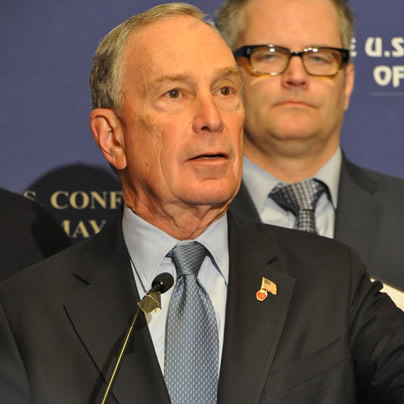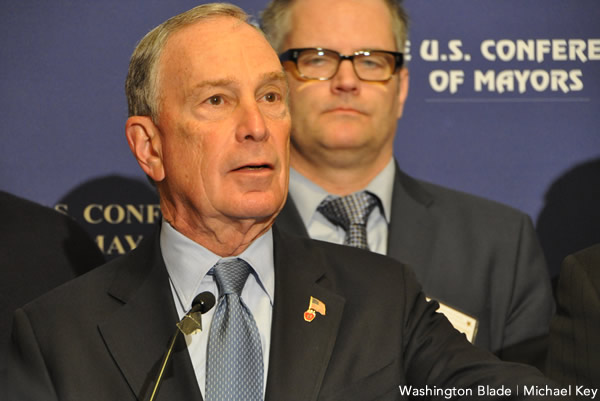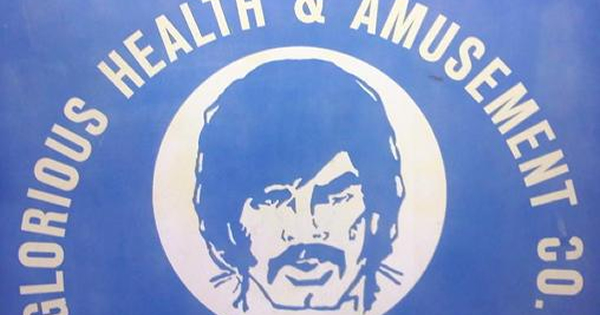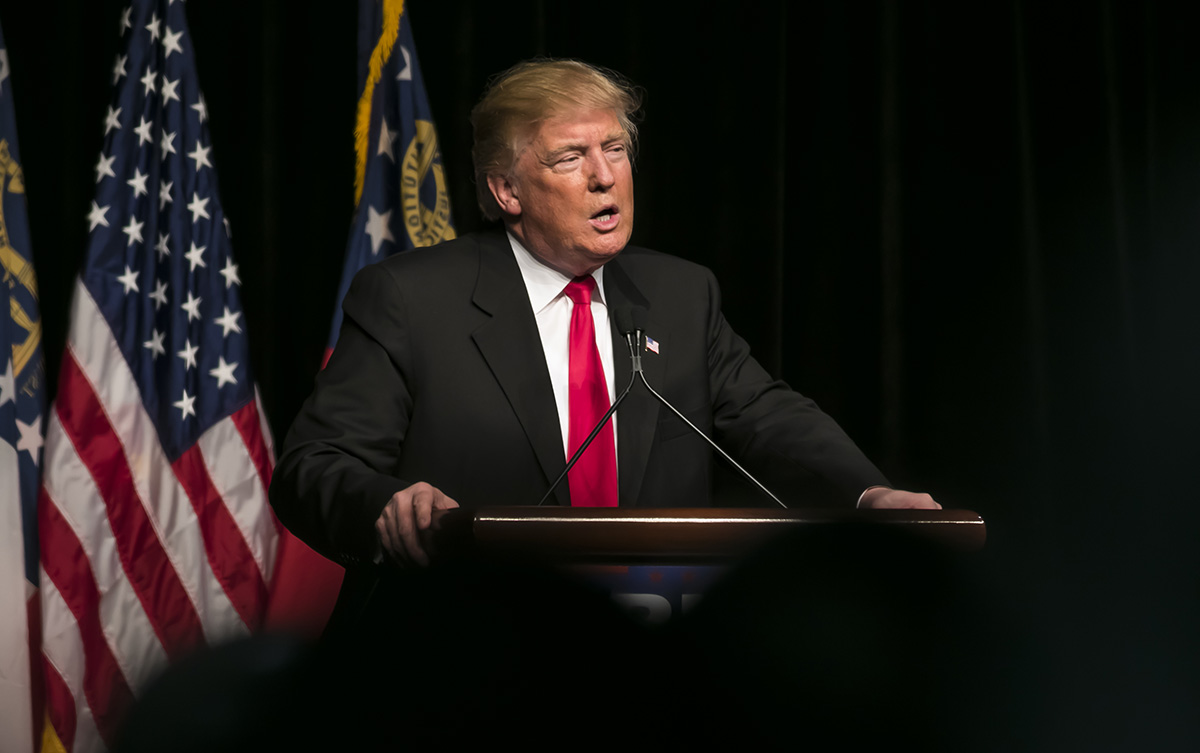National
NYC latest to call on Supreme Court to overturn DOMA
Brief contends anti-gay law undermines benefits afforded by city


New York City Mayor Michael Bloomberg is calling on the U.S. Supreme Court to strike down DOMA (Blade file photo by Michael Key)
New York City Mayor Michael Bloomberg and lesbian New York City Council Speaker Christine Quinn have joined the growing choir of individuals calling on the U.S. Supreme Court to overturn the Defense of Marriage Act.
On Wednesday, attorneys representing the City of New York — as well as Bloomberg and Quinn in their official capacities — filed a friend-of-the-court brief asking the justices to take up lesbian Edith Windsor’s challenge to DOMA, known as Windsor v. United States.
Windsor, a New York City widow, had to pay nearly $363,000 in federal estates taxes upon the death of her spouse, Thea Spyer, in 2009 because of Section 3 of DOMA, which prohibits federal recognition of same-sex marriage.
The 14-page brief calls DOMA “the last remaining obstacle to achieving legal equality between the city’s married couples” while making the case to strike down the anti-gay law.
“Solely because of DOMA, Edith Windsor was required to pay more than $363,000 in federal estate tax on her legal spouse’s estate,” the brief states. “If Ms. Windsor’s spouse had been a man, the marital exemption provided by federal law would have applied and she would not have owed any federal estate taxes at all. As a result of DOMA, thousands of legally married same-sex couples in the New York City are being subjected to this type of disparate treatment because their legal marriages are not recognized under federal law.”
The American Civil Liberties Union, which filed the lawsuit on behalf of Windsor, has already filed a request with the Supreme Court calling on justices to take up the lawsuit and overturn DOMA. Windsor has already seen some success. The U.S. District Court for the Southern District of New York already ruled in her favor and ordered that Windsor be refunded the $363,000 in taxes she had paid.
The request from New York City is one of several calling on the Supreme Court to review DOMA. Both supporters and defenders of the law have made requests to the Supreme Court, including the House Republican-led Bipartisan Legal Advisory Group, which took up legal defense of DOMA after the Obama administration announced it would no longer defend it, and the Justice Department, which has since been actively litigation against DOMA. Massachusetts Attorney General Martha Coakley has also asked the Supreme Court to review and strike down DOMA on the basis that it violates a state’s right to regulate marriage under the Tenth Amendment as has Lambda Legal in the case of Golinski v. Office of Personnel Management.
The brief presents the same question to the Supreme Court that has already been asked in earlier briefs asking justices to consider the anti-gay law: Does Section 3 of DOMA violate the Fifth Amendment’s guarantee of equal protection of the laws as applied to persons of the same sex who are legally married under state law?
But the brief goes into different territory than previous requests because it explains why DOMA has a particularly adverse impact on New York City. The State of New York, under the leadership of Gov. Andrew Cuomo (D), passed marriage equality legislation last year and had recently celebrated the one-year anniversary of enacting that law.
The brief lays out two main arguments why DOMA unfairly impacts New York City: (1) DOMA forces it to be “the unwilling agent” of federally required separate treatment of lawfully married employees and (2) the disparate treatment of legally married couples under DOMA undermines the city’s non-discrimination laws.
According to the brief, one way in which DOMA complicates the policy administration in New York City is related to the health benefits, retirement plans and family leave offered to city employees and their spouses.
“As an employer, the city must identify the gender of the spouses of its lawfully married employees and then single out those employees with a same-sex spouse,” the brief states. “DOMA enforces discriminatory tax treatment of spousal health care benefits. In many other benefit-related matters, the city must either incur the cost and administrative burden of ‘workarounds’ (employer-created benefit structures attempting to compensate for the discriminatory effects of DOMA), or discriminate in its treatment of its married workforce.”
Rose Saxe, senior staff attorney for the ACLU’s LGBT & AIDS Project, praised New York City officials for joining the call for the Supreme Court to review Windsor’s challenge to DOMA.
“We are very pleased that the City of New York has joined our request to have the Supreme Court consider Edie Windsor’s case, particularly in light of the harm that DOMA causes so many married New Yorkers,” she said.
The Supreme Court won’t be able to decide whether to hear the case until justices return from summer recess and the start their conference on September 24.
CORRECTION: An initial version of this article stated that the New York City brief was the fifth petition asking the Supreme Court to review DOMA. That count didn’t take into account a petition filed by Lambda Legal. The initial also inaccurately stated the brief was filed Thursday. The Blade regrets the errors.
District of Columbia
Fire by arson forced temporary shutdown of Glorious Health Club
Spa and art gallery catering to gay
men expects to reopen in August

In a little noticed development, D.C.’s Glorious Health Club, which bills itself as a spa, art gallery, and community center catering to gay men, was forced to close on May 19 after one or more unidentified suspects ignited a fire inside the club that D.C. fire department officials have ruled an act of arson.
Robert Siegel, the club’s owner, told the Washington Blade that he and investigators with the D.C. Fire and Emergency Medical Services Department believe one or more yet unidentified suspects broke into the kitchen of the former warehouse building where the club is located at 2120 West Virginia Ave., N.E.
According to Siegel, investigators with the fire department’s arson squad believe a flammable liquid was used to start the fire in the kitchen and in two other locations within the building.
“Three separate fires were started,” Siegel said. “They started one on a staircase and one on the upstairs storage area,” he said in addition to the one in the kitchen. He said about 40 patrons were in the club at the time the fire started, and all were able to leave without injury.
Siegel said the fire caused $500,000 worth of damage to his building, with some of the damage caused — understandably he said — by fire fighters who had to rip open doors and break through the roof to gain access to the flames that engulfed parts of the interior of the building. He said he arranged for repair work to begin after the fire was extinguished.
“I expect we’ll be reopening in about a month from now,” he said. “And we’ll be a bigger and better place.”
Fortunately, Siegel said, most of the artwork and art exhibits located in the club were not damaged.
“It was basically the kitchen, patio, and the roof,” he said, adding that much of the solar panels he had on the roof were destroyed by the fire or by firefighters seeking to gain access to the building.
“And the fire was so hot it did structural damage to the roof,” he said. “It actually melted steel. We’re talking about 50-foot steel beams that have to be replaced,” he told the Blade. “That’s $100,000 right there.”
Vito Maggiolo, a spokesperson for the D.C. Fire and Emergency Medical Services Department, said the fire was “ruled incendiary/arson” and is “under active investigation.”
It could not immediately be determined if one or more people responsible for the fire targeted the Glorious Health Club because it’s a gay community establishment.
National
House Republicans propose steep cuts in federal AIDS budget
Advocacy groups say move would eliminate ‘Ending HIV Epidemic’ initiative

The Republican-controlled U.S. House Subcommittee on Labor, Health, and Human Services, Education, and Related Agencies approved a spending bill on June 26 that calls for cutting at least $419 million from federal AIDS programs that AIDS activists say would have a devastating impact on efforts to greatly reduce the number of new HIV infections by 2030.
The subcommittee’s proposed bill, which includes billions of dollars in cuts in a wide range of other federal health, education, and human services related programs, is scheduled to be considered by the full House Appropriations Committee on July 10. Officials with AIDS advocacy groups say they are hopeful that the full committee, like last year, will refuse to approve the proposed cuts in the AIDS budget.
The proposed GOP cuts would eliminate $214 million from the U.S. Centers for Disease Control and Prevention’s HIV prevention programs, $190 million from the Ryan White HIV/AIDS Program, and $15 million from the Department of Health and Human Services Secretary’s Minority HIV/AIDS Program.
Activists say the impact of those cuts would kill the federal government’s Ending the HIV Epidemic initiative, which among other things, calls for reducing the number of new HIV infections in the U.S. by 75 percent by 2025 and by 90 percent by 2030. The activists point out that ironically the Ending the HIV Epidemic initiative was launched during the administration of President Donald Trump.
“Instead of providing new investments in ending HIV by increasing funding for testing, prevention programs, such as PrEP, and life-saving care and treatment, House Republicans are again choosing to go through a worthless exercise of cutting programs that the American people depend on and will never pass,” said Carl Schmid, executive director of the HIV + Hepatitis Policy Institute.
“While we vigorously fight these cuts, we look forward to working with the entire Congress in a bipartisan fashion on spending bills that can actually become law,” Schmid said in a statement.
Schmid noted that the bill also includes provisions known as “policy riders” that would take away rights and protections from women, such as access to birth control and abortion, and for minorities, including LGBTQ people.
According to a statement released by the office of Rep. Rosa DeLauro (D-Conn.), who is the ranking minority member of the House Appropriations Committee, one of the policy riders would “block the Biden administration’s policies to ensure nondiscrimination on the basis of gender identity and sexual orientation.’ The statement says another policy rider would “prevent policies or programs intended to promote diversity, equality, or inclusion.”
Most political observers believe the Democratic-controlled U.S. Senate would also kill the GOP proposed policy riders and cuts in the AIDS budget if the full Republican-controlled House were to approve the budget bill passed by the appropriations subcommittee.
Rep, Tom Cole (R-Okla.), who serves as chair of the full House Appropriations Committee, released a statement on June 27 defending the subcommittee’s bill and its proposed spending cuts. “The bill provides appropriate and fiscally responsible funding to ensure these departments can continue to perform their core missions while also acknowledging the fiscal realities facing our nation,” he said.
“Importantly, the bill pushes back on the Biden administration’s out-of-touch progressive policy agenda, preventing this White House from finalizing or implementing controversial rules or executive orders,” Cole said in his statement. “It also preserves long standing bipartisan policy provisions protecting the right to life.”
U.S. Supreme Court
Concern over marriage equality in US grows two decades after first Mass. same-sex weddings
Gay and lesbian couples began to marry in Bay State in 2004

Two decades after Massachusetts became the first state to legalize same-sex marriage, a new study reveals both significant progress and ongoing challenges for married LGBTQ couples in the U.S., with a growing sense of insecurity about the future of their rights.
The Williams Institute at UCLA School of Law surveyed 484 married same-sex couples from all 50 states and D.C. The study, released Monday, marks the 20th anniversary of legal same-sex marriage in the U.S.
Researchers found that 93 percent of respondents cited love as a primary reason for marrying, with 75 percent also mentioning legal protections. Over 83 percent reported positive changes in their sense of security, and 74.6 percent noted improved life satisfaction since marrying.
However, the study also highlighted persistent discrimination and growing concerns about the future. About 11 percent of couples who had a wedding reported facing prejudice during the planning process.
Alarmingly, nearly 80 percent of respondents expressed concern about the potential overturning of the 2015 Obergefell v. Hodges decision, which legalized same-sex marriage nationwide. This anxiety has been exacerbated by initiatives like Project 2025, a conservative policy blueprint that some fear could roll back LGBTQ rights if implemented.
The possibility of a former President Donald Trump victory in the upcoming election has further intensified these concerns. Many respondents cited Trump’s previous U.S. Supreme Court appointments and his statements on LGBTQ issues as reasons for their apprehension. One participant stated, “The thought of another Trump presidency keeps me up at night. We’ve come so far, but it feels like our rights could be stripped away at any moment.”
The current political climate has 29 percent of respondents considering moving to another state, with 52.9 percent citing socio-political concerns as a primary reason. This reflects a growing sense of insecurity among LGBTQ couples about their rights and freedoms.
Brad Sears, founding executive director of the Williams Institute, noted, “The data clearly show that marriage equality has had a profound positive impact on same-sex couples and their families. However, it also reveals ongoing challenges and serious concerns about the future of these rights in light of current political trends and the upcoming election.”
Christy Mallory, legal director at the Williams Institute and lead author of the study, added, “This research provides crucial insights into the lived experiences of same-sex couples two decades after marriage equality began in the U.S. The high level of concern about potential loss of rights underscores the continued importance of legal protections and public support for LGBTQ+ equality.”
The study found that 30 percent of surveyed couples have children, with 58.1 percent of those parents reporting that marriage provided more stability for their families. However, many of these families now worry about the security of their legal status in the face of potential policy changes and shifting political landscapes.
As the nation reflects on two decades of marriage equality, the study underscores both the transformative power of legal recognition and the ongoing need for vigilance in protecting LGBTQ+ rights. The findings highlight the complex reality faced by same-sex couples in America today: Celebrating hard-won progress while grappling with uncertainty about the future, particularly in light of upcoming political events and potential shifts in leadership.
-

 Canada2 days ago
Canada2 days agoToronto Pride parade cancelled after pro-Palestinian protesters disrupt it
-

 Baltimore4 days ago
Baltimore4 days agoDespite record crowds, Baltimore Pride’s LGBTQ critics say organizers dropped the ball
-

 Sports5 days ago
Sports5 days agoHaters troll official Olympics Instagram for celebrating gay athlete and boyfriend
-

 U.S. Supreme Court1 day ago
U.S. Supreme Court1 day agoConcern over marriage equality in US grows two decades after first Mass. same-sex weddings











